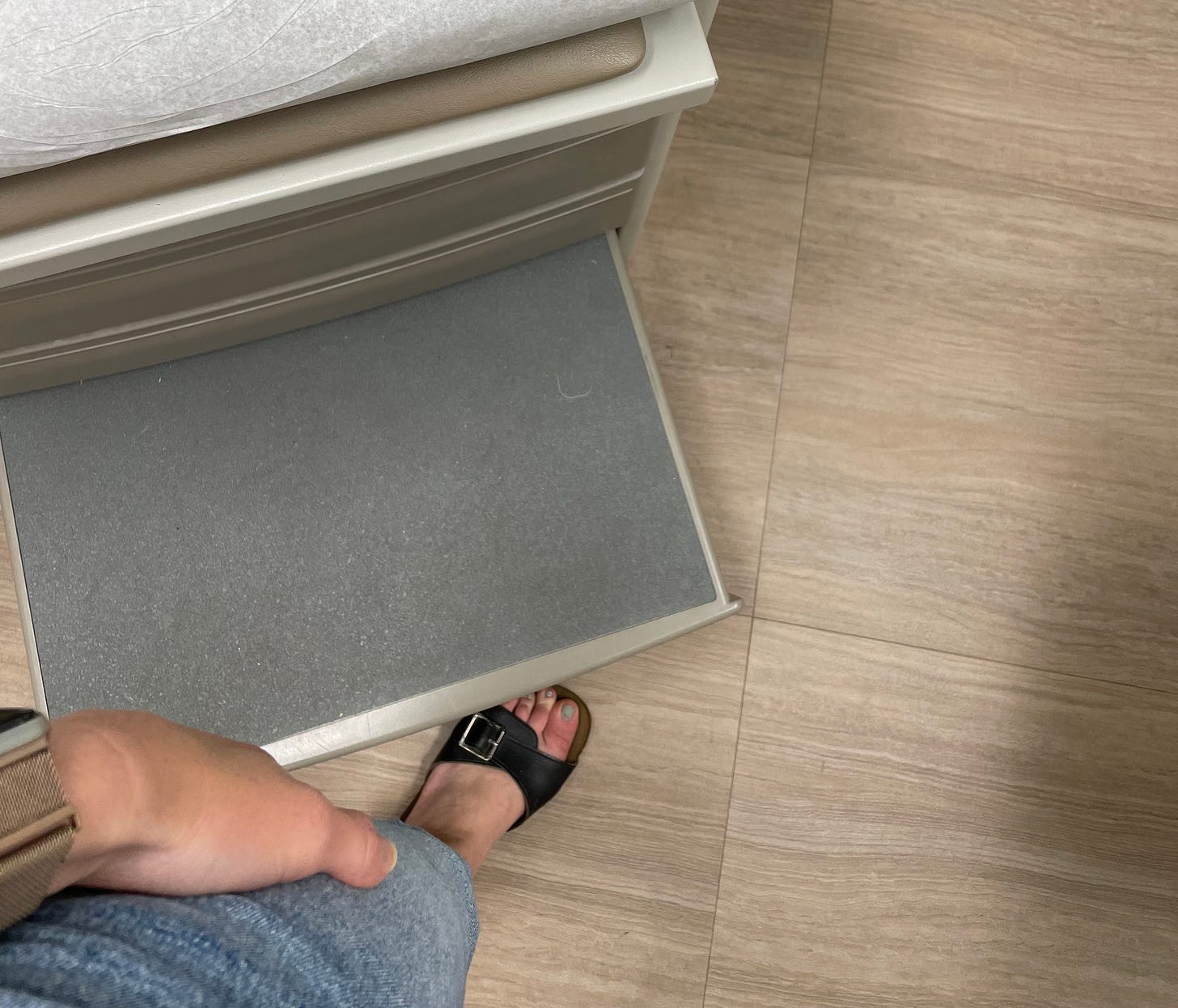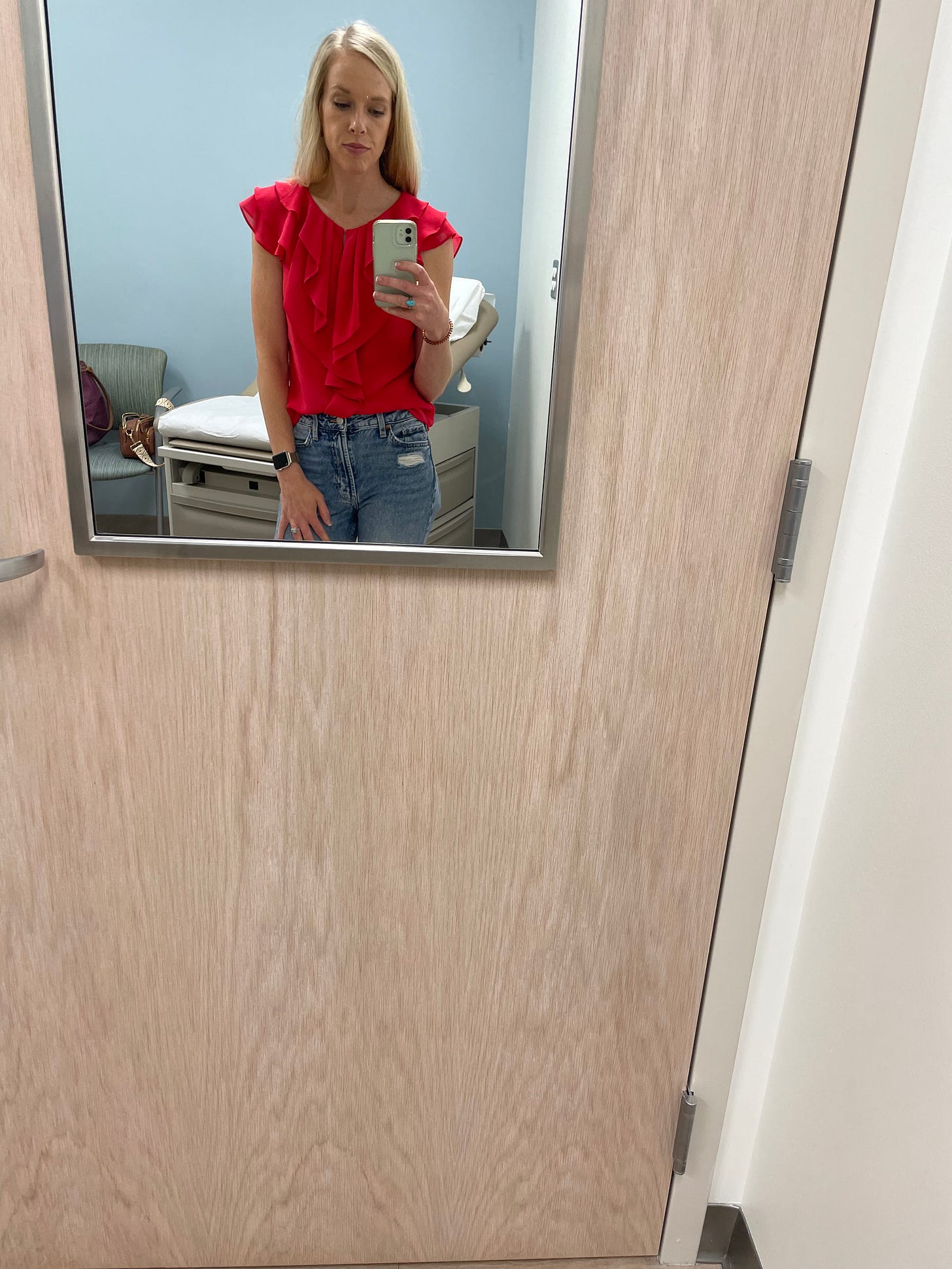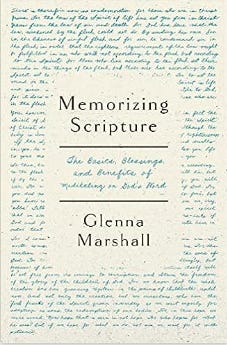I am wandering the long hallway of a medical center, trying to breathe.
The anxiety surprises me this time. I am heading toward the placard that reads Cancer Center, but I don’t have cancer. It’s just my annual checkup, an extra precaution since my mom was diagnosed with breast cancer at a relatively young age. I know this, but my body seems to be living in a different story.
I walk by a brightly lit shop filled with wigs and spa-like treatments, accoutrements to lessen the terrible blow of cancer treatment. I see a woman on the phone in a corner, whispering, and I wonder if she’s relaying bad news. There is a man twiddling his thumbs in the waiting room, eyes darting toward the doctor’s office door. I feel the stories of so many who are here for different reasons. I feel myself shiver. My pulse picks up. My breathing quickens.
“Even though I walk through the valley of the shadow of death,” I whisper to myself, breathing in, “You are with me…”
This place is that valley for many people. This place where I will have a short annual visit — from which I will emerge with my orders for a mammogram, maybe an MRI, and head back into everyday life until the next annual visit — this is the place where bad news is delivered, along with cautious hope for treatment.
Of course, I think of my mom, who spent much of her 20 years with cancer in places like this. To walk into these spaces is not so much to miss her as to realize that I missed the opportunity to say more often: “This is so hard, Mom.” “How did you do this, Mom?” I appreciate her strength at a deeper level as I wonder if I could muster it in these same halls.
It's ironic that I’m anxious during my walk to this particular appointment, because I listened to a book on anxiety during the drive here. Perhaps The Anxiety Opportunity by Curtis Chang primed me to sense the feeling of it more readily than I might have otherwise. Despite this prep work, I remember how hard it is to talk myself out of anxiety when it rises up unannounced.
What I’m feeling this day would fall under what Chang calls health or medical anxiety. I feel embarrassed (Ashamed? There’s a chapter on that too) to admit that I am familiar with this sort of health anxiety. There was a six-month period in 2020 defined by medical crises and loss that left an indelible mark on my subconscious. It showed me that the worst-case scenario can happen. Sandwiched within the pandemic, this period of time left me sensing that the worst was always about to happen, because it had happened a few times in a row.
A few years later, my body still seems to keep a little record of that possibility of crisis. It pulls up the file, or at least threatens to, anytime I darken the doorstep of a medical facility. Its grip isn’t as strong as it used to be, but it’s still there. It plucks me out of the present and makes me relive moments when the medical scares were real.
But that time period also showed me that God can still be good and near in the midst of our worst-case scenarios. For some reason, it takes a lot of mental effort to remember that. For some reason, my body doesn’t naturally remember the resolutions, the grace, the goodness that accompanied each of those scares. I have to remind my brain of the actual outcomes, of the surprising growth and good that came with it. I have to step into these runaway ruminations and replace them with something truer.
“Surely goodness and mercy shall follow me all the days of my life,” I say with the rhythm of my footsteps. “And I shall dwell in the house of the Lord forever.”
Back at my desk is the new book Memorizing Scripture by Glenna Marshall. I’ve been working my way through it on lunch breaks, Sunday afternoons and during a sweet evening on a little beach with my oldest daughter last week.
“Whatever you pour into your mind will affect your thought life and influence your response to temptation,” she writes.
I think of predictable Psalm 23, which I first memorized in kindergarten. It helped me breathe my way down that medical hall yesterday, as it has helped me through so many other circumstances, big and small. It reminded me that the Lord was with me and would be. The kids and I said it together on Aug. 23 as we drove to the first day of a new school year. “The Lord is their Shepherd too,” I thought.
I am seeing that Scripture memory is more than some spiritual practice, a box to check while charting toward sanctification. It is the antidote to the other parts of my memory that so easily forget. It is the weight I can place on the other end of the scales of my fears. It is the eternal weight that will outweigh this temporary hardship, this skittish, anxious, forgetful mind of mine.
It is my memory against my memory. If my body is going to keep the score, my brain must too. And this present reality is not the one that will win.
So, yes, my body does remember things. It remembers things I’d like to forget. It revisits memories I wish weren’t there. It shivers and sweats and gets inconveniently nauseated. But my brain and soul get to keep scorecards too. So, until that day when I will be able to truly love the Lord with all my renewed heart, soul and might (Deut. 6:4-7), I will memorize so that I can remember, so that I can tell my fickle frame a different story about this present moment.
Because God has not forgotten to be gracious…
“I will remember the deeds of the Lord;
yes, I will remember your wonders of old.
I will ponder all your work,
and meditate on your mighty deeds.”
— Psalm 77:11-12





